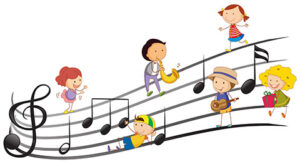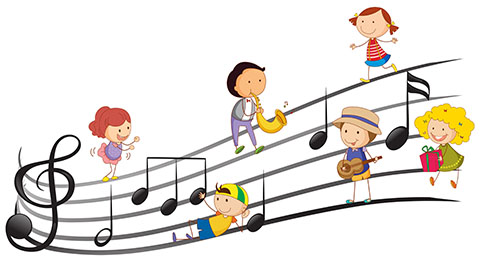By: Ms. Bernadette Shanti
Why do children need to learn music at their early age, such as in Kindergarten?
Do we prepare them to be musicians or music performers?

The answer can be the same as we change the word ‘music’ into ‘science’ or ‘sport’. Learning Science doesn’t mean to be a scientist because it’s important for general knowledge, and learning sport doesn’t mean every student has to become an athlete because it’s important for their health. Thus, what is the importance of learning music in kindergarten?
As we know, a child’s brain develops in the critical period around age 2 and 7. And early brain development has a lasting impact on a child’s ability to learn and succeed in school and life. The quality of a child’s experiences in the first few years of life – positive or negative – helps shape how their brain develops. Music is known as a good aspect of brain development. Some research shows how early music training (before the age of seven) produces actual physical changes in brain structure and function. Music training even helps the brain to develop faster.
In Kindergarten, children are taught to sing, clap along with the beat, and do some movements. Singing a song helps with alphabet awareness, concepts concerning prints, vocabulary developments, phonics, and decoding and encoding. Singing develop phonological awareness and auditory analysis. Through singing, we can explore a variety of activities to help children become aware of different sounds. In their book, Kodaly in the Kindergarten Classroom, Micheal Houlahan and Philip Tacka write that music can help the learning process in the classroom. A child that has mastered some basic music skills, such as keeping a beat, pointing to icons, singing with correct phrasing, and breathing, and understanding how to inflect one’s voice, is also a good reader. And the success of a child in the music curriculum with a clear literacy component is also often an indicator of how a child is performing in a reading class.
According to Dr. Patricia Wolfe, an expert on the application of brain research to educational practice, many musical experiences can activate the cognitive, visual, auditory, affective, and motor systems, depending on whether you are reading music, playing an instrument, composing a song, beating a rhythm, or just listening to a melody. The mental mechanisms that process music are deeply entwined with the brain’s other basic functions, including emotion, memory, and even language. Therefore, learning music at children’s early age can help to develop many skills. It doesn’t have to be a musician or music performer to learn music since Kindergarten.
Resource:
https://childdevelopmentinfo.com/development/music-is-an-important-ingredient-for-child-development-and-parent-child-relationships/#gs.247z3b | Child Development Institute
https://www.edutopia.org/article/why-ages-2-7-matter-so-much-brain-development
https://news.usc.edu/102681/childrens-brains-develop-faster-with-music-training/
Mícheál Houlahan, Philip Tacka, 2014, Kodaly in the Kindergarten Classroom.



